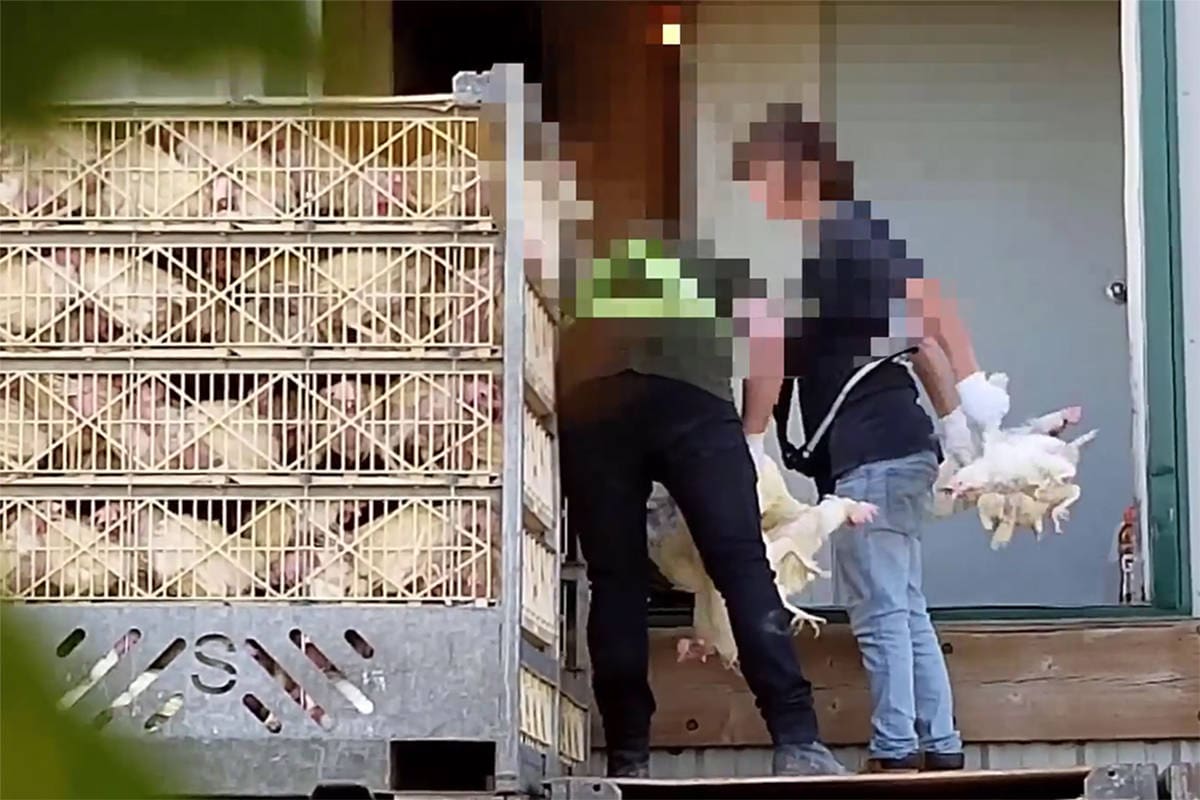Animal activists release video of animal cruelty at Abbotsford egg farm
Video has been released by local animal activists which appears to show yet another case of extreme animal cruelty at an egg farm in Abbotsford, B.C.
Similar cases of alleged cruelty to chickens at farms in Abbotsford occurred in 2017 and 2018.
The group, BC Animal Ag Uncovered, released the following video and press release.(Warning: graphic):
MORE ANIMAL ABUSE CAUGHT ON VIDEO AT ABBOTSFORD EGG FARM
Video taken on July 15, 2020 shows severe animal cruelty at an egg farm on the 32000 block of Huntingdon Road in Abbotsford, B.C. The disturbing footage shows workers callously throwing spent egg-laying hens into crates, grabbing the chickens by a single leg or wing. One of the workers is seen wearing an ELITE Chicken Catching Services shirt.
Unedited longer video clips can be viewed here and here.
The witness who took the new video said, “the chickens were being flung into crates head-first,” “some were thrown in cages by their wings and many thrown in by one leg. I saw workers close the crate lids on the necks and limbs of these poor birds.”
After reviewing the footage, Veterinarian Dr. Nadine Meyer stated, “improper handling of chickens, as seen here several times, may result in injuries ranging from bruises and head trauma (concussions), to fractured bones or dislocated joints.”
Sadly, this is not the first time Elite Farm Services Ltd. has been caught abusing animals. In June 2017, Elite was the subject of a video exposé after a whistleblower of animal rights group Mercy For Animals filmed employees stomping on live birds, ripping conscious chickens apart and violently slamming others against crates & walls. CTV coverage can be viewed here.
Additionally, Elite was associated with another animal cruelty investigation at a different Abbotsford egg farm in 2018. Media coverage for the story can be found here and here.
The company was charged with 38 counts of unlawfully harming chickens related to the 2017 Mercy For Animals investigation. Their pre-trial conference was in New Westminster Thursday August 13, 2020. There will be a preliminary inquiry on September 28 and Elite is scheduled to be tried by Jury in January 2021.
“In 2017, Mercy For Animals exposed egregious animal abuse by Elite Farm Services, with chickens having their limbs torn off and being tossed around like footballs, slammed into objects and hit and kicked,” said Leah Garcés, president of Mercy For Animals. “It’s very concerning that this new footage suggests the company, which still has charges pending for its beating and loading of chickens in the prior case, apparently has not done enough to stamp out rough handling and callous treatment of animals.”
According to section 6 of the industry’s own Code of Practice for the Handling of Laying Hens,
“Hens have weak bones by the end of lay. As a result, there is a high risk of bone fractures when hens are handled prior to transport (2). Care in handling, such as catching end-of-lay hens by both legs rather than one, reduces bone breakage (8). If layer hens are carried by one leg only, there is a greater chance of birds suffering from fractures and hip dislocations.”
“All parties involved in the catching and transporting process have a responsibility and obligation to ensure catching, transfer, and holding on-farm is undertaken in such a manner that minimizes stress and injury.”
“Birds must be placed in transport containers gently…”
-ends-
VHS is monitoring the situation and will comment further as details emerge. Media coverage can be seen here.

